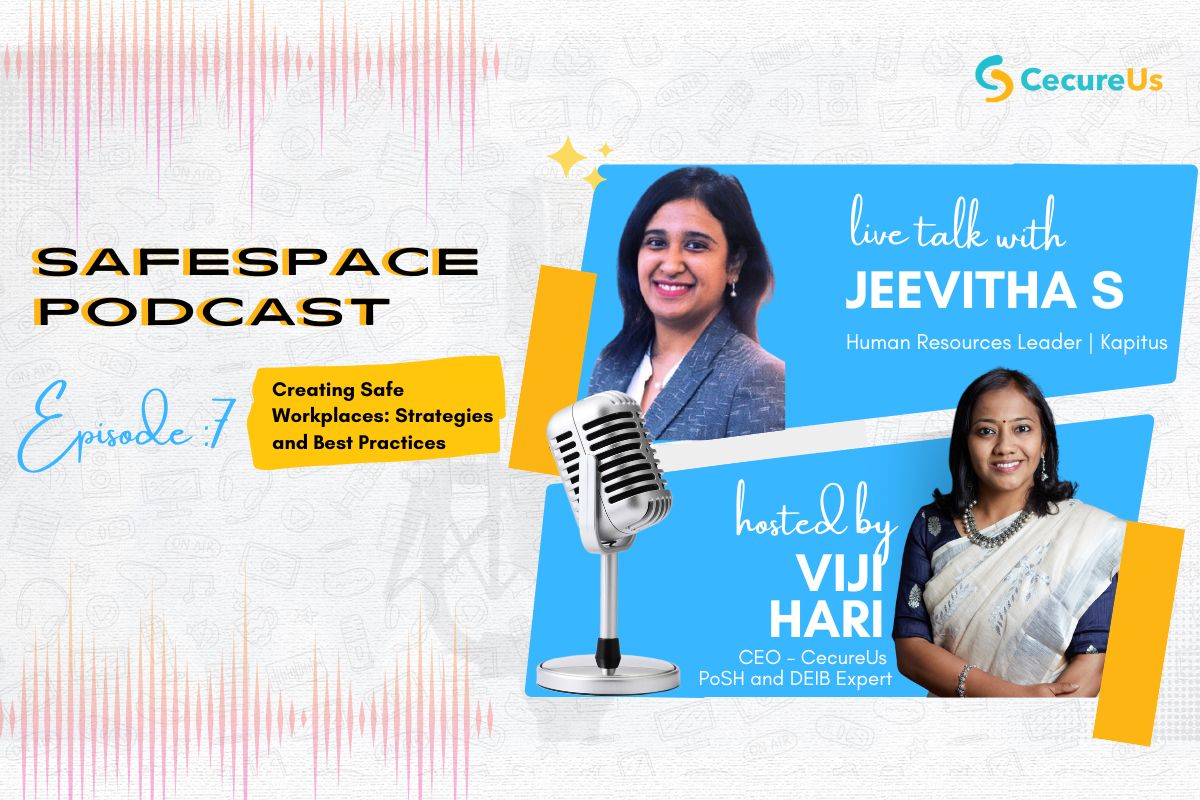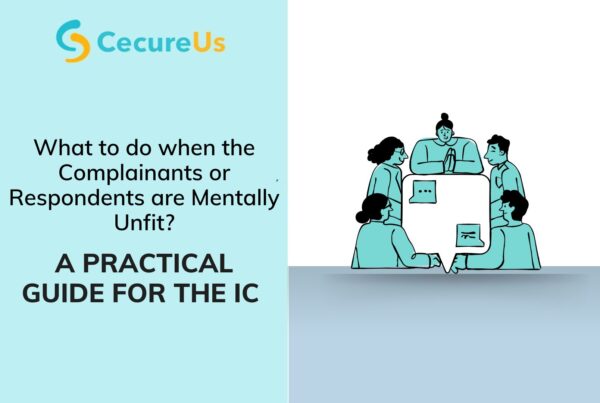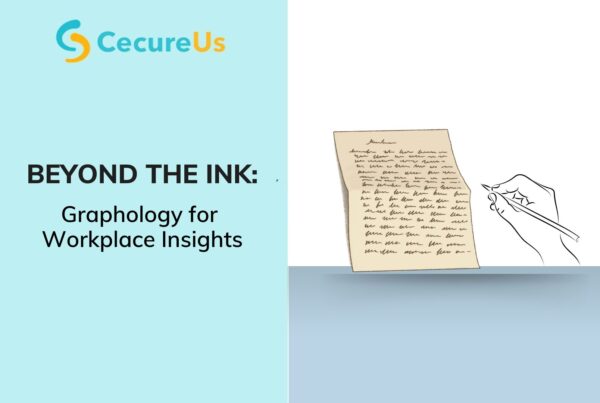
Host: Viji Hari
In this special episode of The Safe Space Podcast, host Viji Hari is joined by industry expert Ms. Jeevitha Shanmugam, the Head of HR at Kapitus. A seasoned and results-oriented HR professional, Jeevitha is renowned for improving retention, streamlining hiring practices, and helping organizations gain a competitive advantage. With extensive experience in the recruitment domain, she has worked across Fortune 500 companies, medium-sized enterprises, and startups. Together, Viji and Jeevitha will discuss a topic that impacts all organizations—creating safe workplaces. This episode is particularly significant, as today, December 9th, marks the 11th anniversary of the Sexual Harassment of Women at Workplace Act coming into effect in 2013. It’s a fitting occasion to delve into this crucial subject and explore its ongoing impact.
Jeevitha’s Journey to Leadership
Jeevitha attributed her decision to pursue a career in HR to her innate ability to connect with people and build trust. She views workplaces as “second homes,” where individuals spend a significant portion of their lives. Her commitment to fostering safe and inclusive environments stems from the belief that these spaces should not only function effectively but also be welcoming and respectful for everyone.
Having worked across diverse organizational cultures, Jeevitha has faced unique challenges, particularly related to cultural impacts and communication barriers. She emphasized the importance of addressing these issues to cultivate a culture of safety, diversity, and inclusion.
Addressing the Grey Areas
Jeevitha highlighted the challenges of addressing “gray areas” in workplace harassment cases. She recounted an incident where an employee raised a subtle concern about an uncomfortable conversation. While the complaint did not meet the strict criteria of sexual harassment, it carried undertones that warranted attention.
To address such cases, it is important to focus on building trust through open communication, gathering comprehensive evidence discreetly, and providing sensitivity training to the team. The individual who raised the concern was supported through counselling, while the person responsible underwent one-on-one coaching to understand organizational values and acceptable behaviour. This holistic approach not only resolved the issue but also set a precedent for handling ambiguous situations effectively.
Best Practices for Safe and Inclusive Workplaces
Jeevitha outlined several best practices organizations can adopt to create genuinely inclusive environments:
Leadership Commitment: Safe workplace initiatives must be championed by leaders. Setting an example at the top fosters a trickle-down effect, reinforcing policies and cultural values.
Policy Clarity and Communication: Clear, well-defined policies and open communication channels empower employees to report concerns. Regular sensitivity training ensures awareness and adherence.
Employee Support: Both complainants and respondents should receive adequate support. Counseling, therapy, and coaching can help address the emotional impact of harassment or false accusations.
Engagement and Feedback: Employee engagement through surveys, team activities, and HR connects helps identify red flags such as withdrawal, low collaboration, or high attrition. These indicators reflect the health of workplace culture.
Inclusive Strategies: Involve employees in designing and implementing inclusion strategies. This collaborative approach fosters a sense of belonging and encourages innovative solutions.
Red Flags in Workplace Culture
High attrition rates, low engagement in team activities, and lack of participation in organizational events like “Fun Fridays” are clear indicators of an unsafe or non-inclusive culture. Jeevitha emphasized the importance of addressing these issues proactively to ensure employees feel valued and included.
Bursting Myths Around Workplace Safety
Viji moves on to dispelling myths about workplace safety.
Myth#1 Workplace safety is only about preventing physical accidents.
Jeevitha quickly dismisses this, emphasizing that safety also includes psychological and mental well-being. She explains that psychological safety influences how people think and perform, making it essential to the workplace environment.
Myth#2 Safe and inclusive workplaces benefit only women or minority groups.
Jeevitha asserts that inclusion benefits everyone. A truly inclusive culture ensures that all employees feel valued and safe, fostering trust and respect across the board.
Myth#3 Creating a safe workplace is mainly HR’s responsibility.
Jeevitha clarifies that it is a shared responsibility, involving leaders, managers, and employees in building a safe culture.
Myth#4 If employees aren’t complaining, the workplace is safe.
Jeevitha warns that silence often stems from fear or a lack of trust. Organizations must actively foster trust and open communication through clear policies and regular awareness initiatives.
Myth#5 Talking about safety and inclusivity makes employees uncomfortable.
Jeevitha notes that stigma often prevents these discussions, but normalizing conversations about safety, just as we’ve done with topics like menstruation, can break barriers and promote inclusivity.
Minute Mentoring
In this segment, Viji and Jeevitha discuss practical, quick-fire insights on fostering safer and more inclusive workplaces.
The most important trait for a safe workplace?
Respect.
The biggest challenge in workplace inclusivity?
Unconscious bias. It often operates without our awareness.
The key to resolving workplace conflicts?
Effective communication. It’s the foundation for understanding, collaboration, and resolution.
Advice for victims ?
Speak up—taking that first step is crucial.
One word for employees to contribute to a safe space?
Trust.
Advice to young women starting their careers?
Embrace your unique perspectives. Own them, grow from them, and use them to propel your journey forward.
Viji wraps up the episode by expressing gratitude to Jeevitha for sharing her expertise on creating safe and inclusive workplaces. She emphasizes the importance of proactive leadership and collaboration in fostering a supportive work environment. The episode highlights the crucial role of HR in promoting workplace safety and inclusivity, encouraging ongoing efforts to build and maintain a positive workplace culture.
This episode of The SAFE SPACE Podcast underscores the significance of leadership commitment and practical strategies for creating safe spaces. We look forward to the next episode, and if you have any specific topics you’d like us to cover, please do write to us. If you’re interested in being a part of this podcast, we’d be happy to have you! You can reach out to me at viji@cecurus.com. Until next time, stay committed to creating inclusive and safe workplaces. Thank you and goodbye!
For more blogs and articles, visit our official website. Contact us for workshops and queries related to POSH, EAP (Employee Assistance Program) , Diversity and Inclusion and Code Of Conduct




